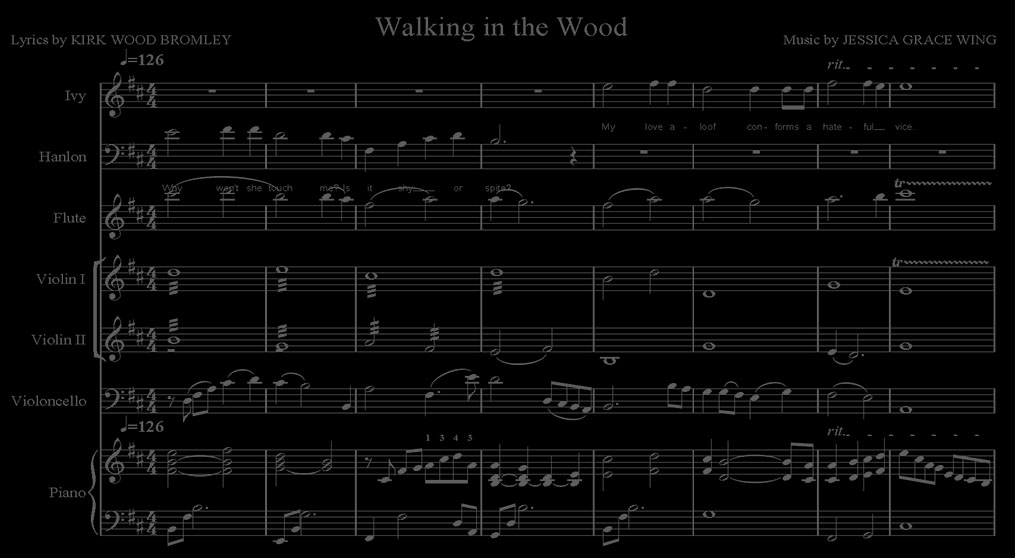LOST is a modern re-telling of the classic Hansel & Gretel fable.
Gaby and Hanlon are two present-day teenagers abandoned by their father in the forest in the Great Smoky Mountains. Gaby is a cutesy but practical girl; Hanlon is an intellectual geek who is a fountain of information and speaks in convoluted and lengthy sentences.
They are found by Laborius, who invites them to come with him to his cabin, where they can eat and phone their father. A white fawn warns them that going with Laborius is dangerous, but they go anyway. They are introduced to Mamba, the wife of Laborius. This couple are actually Ananias and Eleanor Dare, survivors of Roanoke, who have managed to stay alive for 400 years, Ananias by genetically engineering himself, and Eleanor by repeatedly receiving transplants of body parts from various young people who were rescued by Laborius and Mamba.
The idea of lost children, or a lost generation, could be very telling, especially for America right now. And also that it’s a dark, creepy story. I like that a lot, creepy stories. It has a fairly simple cast of characters, and they’re in danger. Also the idea that it’s a coming of age story. Our characters are older than Hansel & Gretel, and at the end of our story they have to make a decision whether they’re going to forgive their father and take him back. That’s a strong dramatic situation. In the original situation, they’re little kids; they don’t have a choice. They’re rescued and they go back to their father. But our teenagers have a choice - they’re fifteen and sixteen.

An established genre provides you with a ready-made vocabulary, and many seminal musicians from whom to draw. For me, writing in a specific genre is fun, and has allowed me to gain a deeper understanding of that formula. This is a starting point, but the true challenge is to establish a style that I find truer to my own leanings. I judge the success of my works not by how close or far they are from a particular genre, but by how closely and powerfully they fulfill their function, whether that is to emphasize a work’s emotional content, to build suspense, etc.
The idea for Lost (which was written and titled before the TV show!) emerged from Jessica and I having done a number of "plays with songs." She had written all the music for those projects, and she had proven herself really skilled at not only writing beautiful tunes in an array of genres, but also at taking my lyrics and making them sing. So, after doing several of these we figured it was time for an all-out musical.
We both gravitated toward Americana in terms of musical style, but in terms of what it would be about, Jessica and our dramaturg, Chad Gracia, felt it needed to be grounded in an established story, and Josh Spafford, another member of Inverse Theater, hit on the idea of Hansel and Gretel. I had always been enchanted by the story of Roanoke, so the research began to combine those. In the process, I found great stuff about Kentucky ghost stories, and the overall textual themes were set.
The result is a really enchanting, scary, gorgeous musical that traffics in both the very real (kids, parents, love) and the very surreal (ghosts, fairy tales, cannibalism) with one foot in the fantastical and one in the historical. Audiences have always loved Lost. Jessica's music is incredible. It goes so many places. It's opera, folk, and musical theater all at the same time. It's always wonderfully melodic, but it's never cliché. And you can feel the humanity, mortality, and ambition of her spirit in every note.
On top of that, the orchestration by Martin Blessinger is world class, the text is poetic and passionate and funny, and the setting and characters are not only fun and wild, but they provide a lot of opportunities for spectacular costumes and scenery. I can still see the cast gasping at and reveling in how amazing the music was to learn and then sing night after night.
Jessica was trying to beat cancer throughout the composition of Lost, and in the later stages it became very hard for her to work. In fact, when she was very near to death, and largely restricted to the bed, a final few sections of the music remained unwritten, and our conductor offered to complete them. So I went and spoke to Jessica and we agreed that it was really important that every note be hers. So she bucked up, found the energy, and finished. She was very strong and driven.
When Jessica died, a lot was lost. Not only her amazing life, but many, many musical works to be that would have emerged from her future as a composer. Only Lost remains. It is a powerful and stunning work in and of itself, but it is even more so because it was Jessica's last piece. She echoes all throughout it.